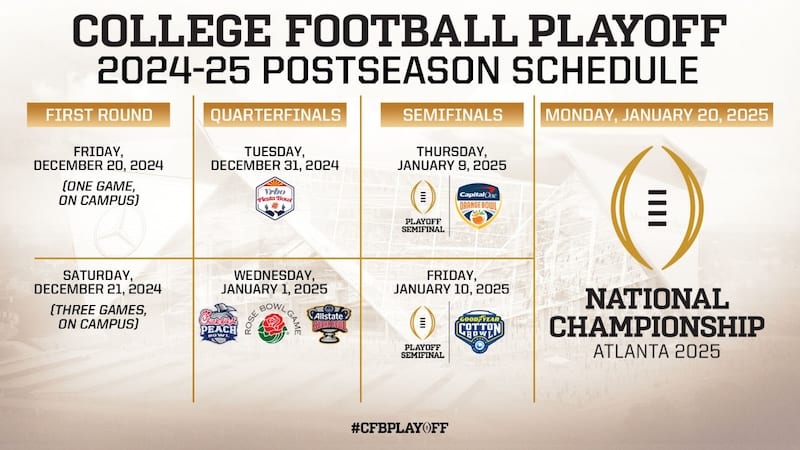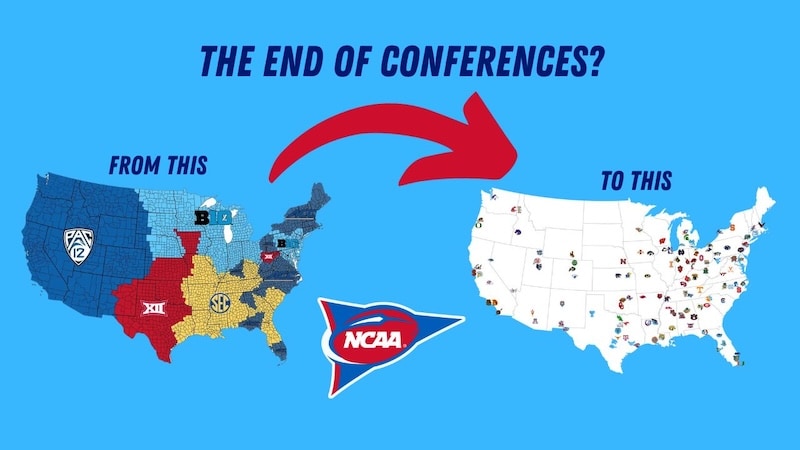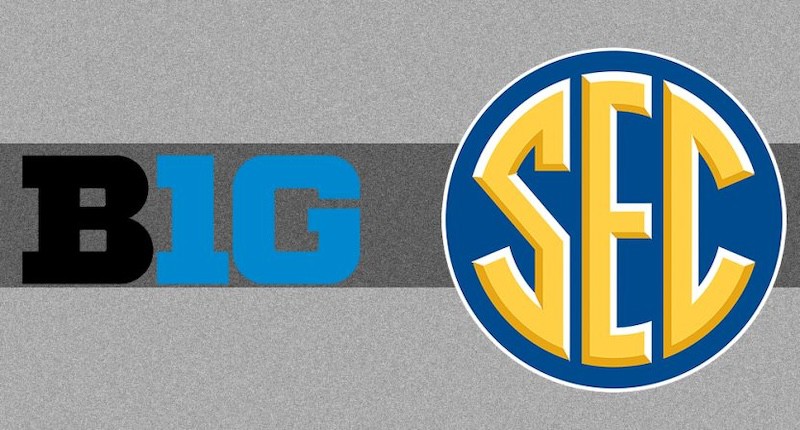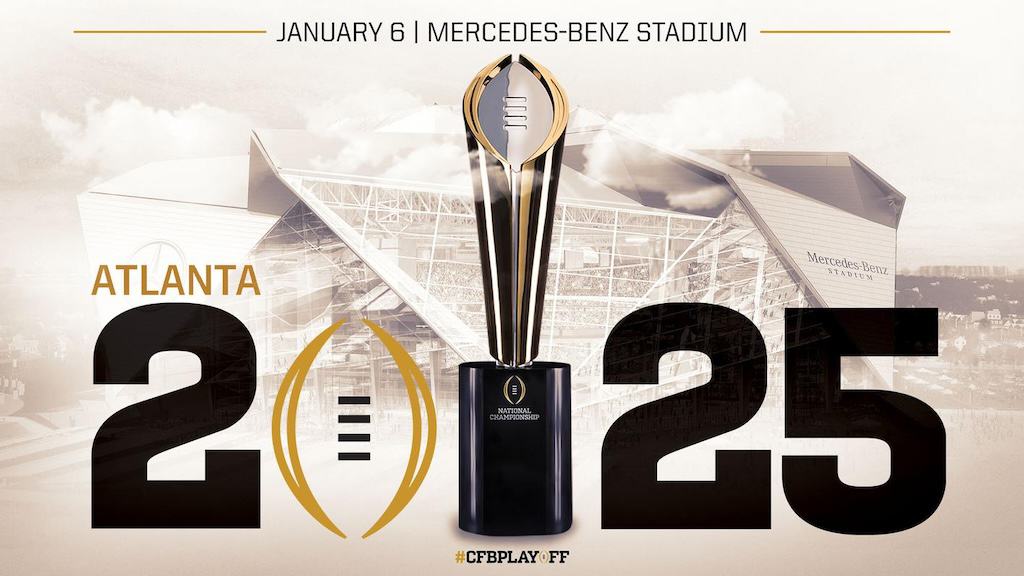College football is not merely a sport. It’s a cultural phenomenon, a testament to American unity and rivalry—all fought on the gridiron. As we look ahead to 2024, it’s evident that we’re on the cusp of witnessing several groundbreaking shifts that promise to alter the very fabric of the game.
The college football landscape we once knew is giving way to a new era. In this in-depth analysis, Sports Hub unpacks the transformations that are set to redefine one of the world’s most-watched and most-bet sports. Strap it up, because CFB is getting a major facelift in 2024.
College Football Playoff Expansion
The College Football Playoff (CFP) has been a significant point of contention since its inception. It was designed to replace the Bowl Championship Series, aka the BCS, which pitted the top two ranked college football teams in a national championship game. The CFP expanded the quest for a national champion to four teams.

Arguably the biggest change in college football in 2024 will be the new 12-team playoff. There has been talk of playoff expansion for the better part of the last five or so years. It will happen in 2024. Twelve teams will compete for the ultimate prize – the national championship. How it all plays out will bring quite a change to college football.
How the 12-Team Playoff Will Work
One of the big things with any playoff system in NCAAF is maintaining the tradition of the sport’s season-ending bowl games. The new 12-team CFP will continue to do just that. The top four seeds will be the four highest-ranked conference champions. They will all receive a first-round bye to the quarterfinals.
The first round games will be held at the home site of the higher seeded team or at a site designated by the higher seeded team. For example, Georgia plays its home games at Sanford Stadium on the school’s campus. For a CFP first round game though, the Bulldogs may elect to play at Mercedes-Benz Stadium in Atlanta.

All of the first round games in 2024 will be played over the weekend of Dec. 20-21. One game will be scheduled for Friday, December 20. The other three games will take place on Saturday, December 21. The winners of those games will then play in the quarterfinals on either New Year’s Eve or New Year’s Day. The schedule for this year’s quarterfinals is as follows:
- Dec. 31: Fiesta Bowl
- Jan. 1: Peach Bowl
- Jan. 1: Rose Bowl
- Jan. 1: Sugar Bowl
The Semifinals & National Championship
The CFP national semifinals will take place the following weekend. The Orange Bowl will be played on Thursday, January 9. The Cotton Bowl will be played on the following day, Friday, January 10. The winners of these games will meet the following Monday (January 20) for the national title.
The 2025 college football national championship game will be held at Mercedes-Benz Stadium in Atlanta. It will be the third time since the start of the College Football Playoff that Mercedes-Benz Stadium has hosted the national title game.
Just for Fun – A 12-Team Playoff for 2023
Since we’re thinking about next season’s change to a 12-team playoff in college football, why not take a look at what that playoff would have looked like if it had been approved for this past season. It would have started with the Top 4.
Michigan, Washington, Texas, and Alabama each won their respective conference and were ranked No. 1 through No. 4 after conference championship week. Those four teams would have received first round byes.

The other Power 5 conference champion – last year it was Florida State – would also make the field. The Seminoles were ranked No. 5. The CFP field will also include the highest-ranked Group of 5 team. Last year, that was 13-0 Liberty, champion of Conference USA. The Flames were ranked No. 23 prior to bowl season.
That leaves the next six highest ranked teams, which would receive at-large bids. Last season, that would have been Georgia, Ohio State, Oregon, Penn State, and Ole Miss. The first round of last year’s playoff would have looked like this:
- No. 12 Liberty @ No. 5 Florida State
- No. 11 Ole Miss @ No. 6 Georgia
- No. 10 Penn State @ No. 7 Ohio State
- No. 9 Missouri @ No. 8 Oregon
Teams will not be reseeded, meaning the top seed would play the winner of the No. 8-No. 9 game. That would have meant Michigan would have played the Missouri-Oregon winner in one of the traditional New Year’s Six bowl games.
College Football Conference Realignment
If the 12-team playoff is the biggest change in college football, the realigning of the conference’s that make up the sport is next on the list. Gone is the Pac-12, which now becomes the Pac-2 as we will see momentarily. Incidentally, the Pac-12 has the record for the most team national championships among all NCAA conferences. That is why it was hailed as the “Conference of Champions.”
In 2024, USC, UCLA, Oregon, and Washington will compete in the Big Ten. The Big Ten will now have 18 teams, making it the largest conference in the FBS. Arizona, Arizona State, Colorado, and Utah will all move to the Big 12 this season. The Big 12 added BYU, UCF, Houston, and Cincinnati just last year. The conference will have 16 teams in 2024.

With just four teams left in the Pac-12, Cal and Stanford agreed to jump to the ACC. SMU, formerly of the American Athletic Conference, also joins the ACC, giving the conference 17 total teams. That leaves the new “Pac-2” with just Oregon State and Washington State. The two schools will partner with the Mountain West Conference to develop next year’s schedules.
The long-awaited jump sees Oklahoma and Texas now among the SEC in 2024. That will take the SEC to 16 teams and strengthen what is already considered college football’s strongest conference.
Army will join the AAC where it will keep its rivalry with Navy, which has been a member since 2015. Kennesaw State moves from FCS to FBS next season. The Owls will be the 134th FBS team and play in Conference USA.
College Football Loses Regional Identity
The 2024 college football season will mark the first in the history of the game where teams will lose much of their regional identities. There was a time when teams from the Northeast – Penn State, Pitt, Temple, Boston College, and Rutgers, for example – all played each other. Teams in the Atlantic Coast Conference were located on – or pretty close too – the Atlantic Coast.
That all changes in 2024. Stanford, located in Palo Alto, California, is now a member of the ACC. The western border of both Washington and Oregon is the Pacific Ocean. Both the Huskies and Ducks will play in the primarily Midwest Big Ten. SMU, located in Dallas, Texas, joins California…yes, California…in the Atlantic Coast Conference.
College football began losing its regional identity years ago. There is no more Border War – Kansas vs. Missouri. Thanksgiving Friday was reserved for the annual year-end Oklahoma-Nebraska clash. Pitt played Penn State in a Pennsylvania rivalry that spanned from 1935 to 1992. The Panthers also played West Virginia in the annual Backyard Brawl, which will actually rekindle in 2024.
With all of the conference alignment in 2024, college football teams lose even more of their regional identity. Certain rivalries will not continue, but new ones may emerge to take their place.
NCAA 2024 – EA Sports College Football
The impact of NIL (Name, Image & Likeness) rights is being felt all throughout college football. The top recruits at certain schools can earn in excess of six figures per season. The best of the best can make even more. Shedeur Sanders, the quarterback at Colorado and the son of head coach Deion Sanders, was the top NIL earner among college football players last season. He is valued at $4.5 million.
Arch Manning, nephew of Super Bowl champion brothers Peyton and Eli, is said to be worth $3.7 million. Bronny James, son of NBA superstar LeBron James, is said to be the highest earning college athlete at just over $7.6 million.
These guys took advantage of NIL deals this season 🤑📈
— FOX College Football (@CFBONFOX) February 13, 2024
Who on this list surprises you the most? 🤔 pic.twitter.com/gdjNbSIIe9
This fall, EA Sports will release its video game version of college football. Instead of NCAA 2024, the game will be known as EA Sports College Football. The company had made the college football video game beginning in 1998 but suspended production after a lawsuit was filed against the NCAA and the Collegiate Licensing Company.
The result of that lawsuit is why college athletes are now permitted to earn money on their name, image, and likeness. EA Sports will compensate athletes that appear in EA Sports College Football. NIL will continue to impact the ever-changing college football landscape.

The NCAA juggles the demands of its stakeholders—schools, athletes, and fans—against the backdrop of a burgeoning commercial landscape. Student-athletes are now receiving a piece of the pie they help to create.
The Growing Influence of Betting on CFB
The role of sports betting in college football is an evolving one, and in 2024, it is poised to take a more prominent place in the game’s ecosystem. As legislation opens the floodgates for legal betting across the country, the implications for fans, athletes, and the sport as a whole are profound.
Sports bettors can find college football bets in most states that have opened up legal gambling. Betting on college football has increased exponentially over the past few seasons as more U.S. states passed legislation in favor of sports gambling.

There are some states that do have (and will continue to have) limitations on college football betting within their states. For example, states like New York and Delaware do not allow prop bets on college football. They also, like Arizona, Connecticut, and a few others, do not allow bettors to wager on in-state teams.
For example, bettors in Arizona are not permitted to place bets on Arizona or Arizona State football games. Some states – Connecticut is on – will not allow bettors to place wagers on games played within that state. Some states, like Delaware, only allow betting on college sports if the event is a tournament with a certain number of teams involved.
Big Ten & SEC Form Advisory Committee
Another move that is likely to change college football a few years down the road is the agreement by the Big Ten and SEC to form an advisory committee. The committee will be made up of conference university presidents, chancellors, and athletic directors. The two conferences are the wealthiest and most important in terms of college football. With so much in common, it only makes sense that the two come together to address the future of not just college football, but all college sports.

The advisory council will do just that – advise. The council will advise member schools on all things related to college athletics. The council will also be able to advise other conferences and leagues on issues related to college sports. Many see this as a first step to schools breaking away from the NCAA. Only time will tell.
Technology & College Football
College football is never stagnant. It’s constantly changing and one of the area’s that continues to grow is the evolution of technology. New technology is going far beyond high-definition broadcasts of games. It’s seeping into the core of the game. Coaches are using it to shift strategies and player development. GPS tracking, athlete monitoring systems, and virtual reality training are no longer novelties but staples in preparing the next generation of gridiron greats.
The best college football teams of all-time have long been those that have been able to adapt to change. Nick Saban was pretty unremarkable in the first decade of his head coaching career. He adapted, embraced technology, and embraced change. The result was a Hall of Fame career with seven national championships.
Performance and Fan Engagement
Technology has become so advanced that we now have GPS-linked chips within players’ shoulder pads that provide coaches with real-time data on speed, distance covered, and heart rates. Want to know if an athlete is tired? Check the real-time data.
Player endurance and real-time tactical execution is being redefined by technology. Coaches are using analytics to determine whether or not to go for it on fourth down. They have tons of data on whether they should go for two after a touchdown or simply kick the PAT.

Off the field, virtual reality training programs are becoming indispensable, allowing athletes to mentally rehearse game situations without the physical toll of on-field practice. This leap in technology isn’t just about ensuring peak performance. It’s also enhancing the entire stadium experience for fans with interactive apps that provide these same stats, replays, and personalized content, creating an immersive experience like never before.
The Future of the Game
As we consider the changes college football will undergo come 2024, it’s clear that the sport is at a crossroads, balancing tradition with the compelling push towards modernity. Whether these are a paradigm shift or a mere tweaking of the playbook remains to be seen. What is undeniable is the relentless march of time and the dynamic energy it brings to the game. For fans and bettors, the promise of a more immersive, inclusive, and technologically advanced experience is one to eagerly await.
In the chill of 2024’s fall air, as the stadiums light up under the Friday night lights, and the roar of Saturday afternoon crescendos, one thing is certain. College football in 2024 will captivate us as it always has. It will just do so with a fresh set of changes that reflect the innovation and adaptation inherent to the sport. While college football changes, it remains the same in some ways. It will still be one of the most-watched and most-bet sports in 2024.
College Football FAQs
How many college football teams are there in 2024?
There were 133 FBS teams in 2023. Kennesaw State, located in Georgia, will join Conference USA after the 2023-24 academic year and become the 134th college football team in the Football Bowl Subdivision.
Which conference will have the most teams in 2024?
With the addition of USC, UCLA, Oregon, and Washington, the Big Ten will be the biggest conference in the FBS in 2024. The ACC gains Cal, Stanford, and SMU to give the conference 17 teams. The SEC and Big 12 will have new members in 2024 and each conference will have 16 teams.
What happened to the Pac-12?
Ten of the conference’s 12 teams will relocate to new conferences in 2024. The Pac-12 will continue to exist although it will only have two teams – Oregon State and Washington State. Those two schools have a scheduling agreement with the Mountain West Conference to schedule games for next year’s college football season.
Are there any college football rule changes in 2024?
The biggest rule change so far will be the elimination of the clock stoppage after a first down. The clock will continue to run while the chains are being reset. However, the clock will stop for first downs in the last two minutes of either half. This is similar to the NFL and is being instituted to cut down on the number of plays per game and speed up games.
What is the biggest change in college football in 2024?
The new conference alignments are big, but the biggest change in college football is a new 12-team playoff. The College Football Playoff expands from its top four teams to a 12-team format. The CFP is likely to vote in a “5-plus-7” format where the five highest-ranked conference champions and the next seven highest-ranked teams play for a national championship.





